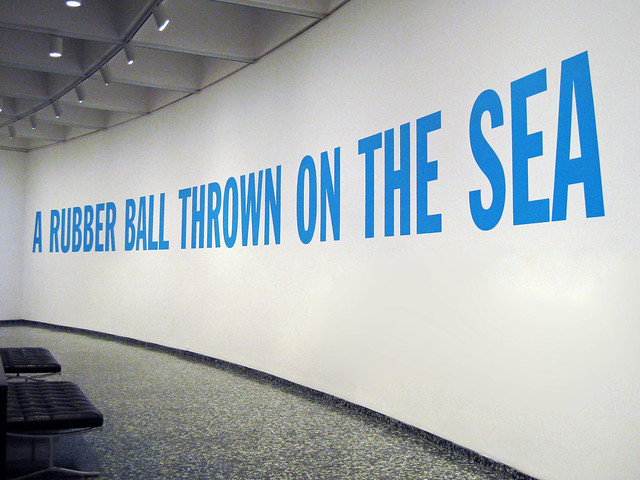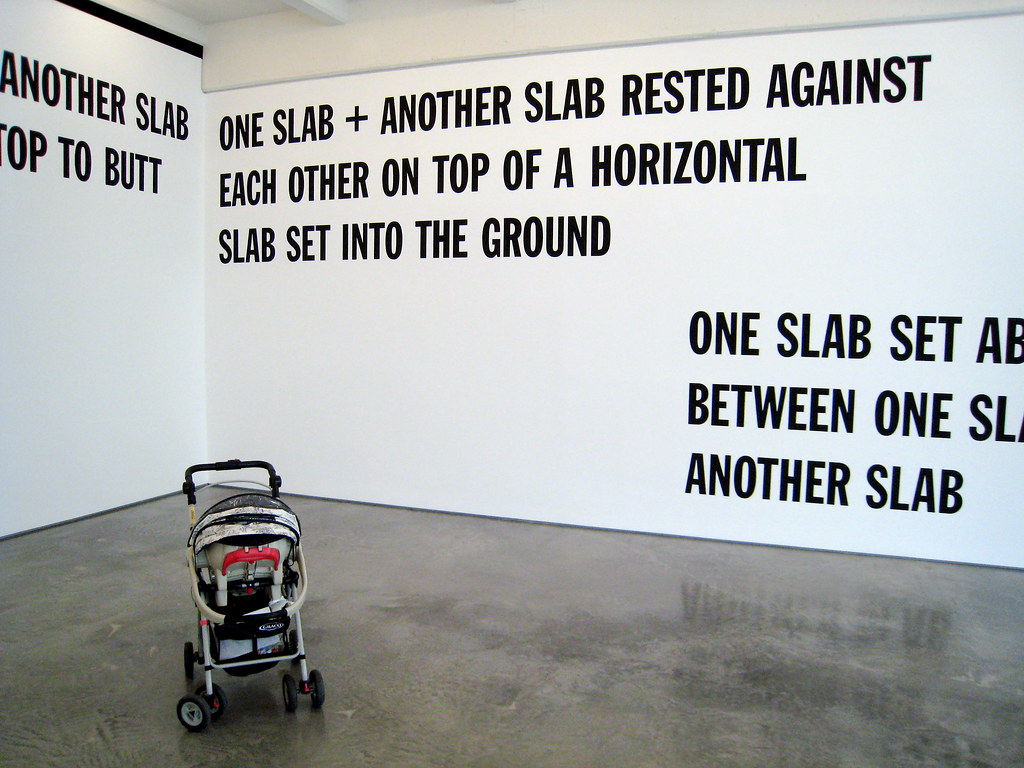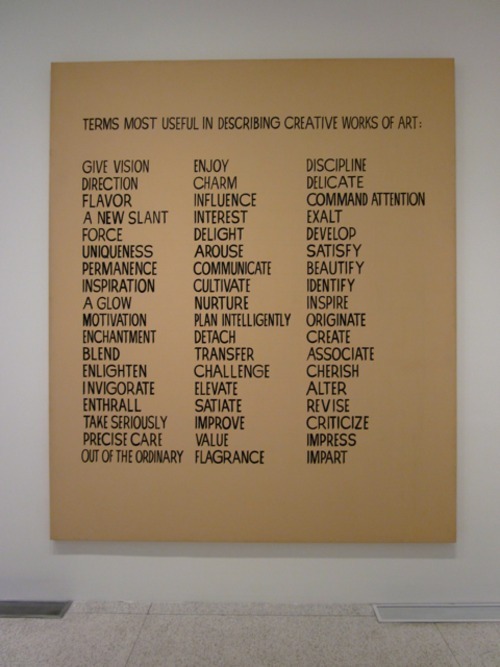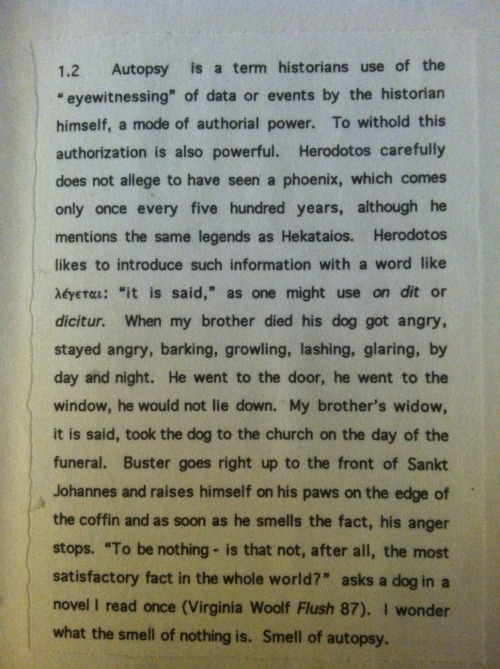 |
| "I am fascinated by the process of purchasing a work by Lawrence Weiner, whose complicated instructions lack the very idea of the "hand of the artist" only in literal terms. The purchase isn't for the lettering itself, but a certificate with the phrase and instructions on how to realize it, specifying the materials or the actual process. Weiner, who has been instrumental in the idea of conceptual art since the 1960s, creates phrases, often ambiguous, that appear in museums throughout the world. The next time you're in a museum and see writing on the wall, don't assume that it's wall text or that the artist himself painted it."(source: TRAVELLIOUS) Must confess, i never thought about, and i must admit: fascinating! |
Wednesday, March 28, 2012
purchasing a work by L. Weiner
Labels:
conceptual art,
lawrence weiner,
lettering,
travellious,
vinyl letters
Monday, March 26, 2012
one slab + another...
 |
by Lawrence Weiner
(source: locomomo at Flickr)
|
Labels:
conceptual art,
lawrence weiner,
vinyl letters
taken from...
 |
by Lawrence Weiner, 1980 Vinyl letters From the accompanying plaque: "In 1968 Lawrence Weiner decided that the physical realization of his ideas was not a necessary condition of his art. A linguistic construction -- presented as a title in the form of a simple descriptive phrase on the wall -- seemed to the artist to be less vulnerable to change over time than an actual sculpture. This work, which describes a physical act of displacement as a metaphor for representation, and its title are thus one and the same." (source: mjthor at flickr) |
Labels:
conceptual art,
lawrence weiner,
vinyl letters
bits & pieces
 |
| Bits & Pieces Put Together to Present a Semblance of a Whole Walker Art Center, Minneapolis, 2005 by Lawrence Weiner |
Tuesday, March 20, 2012
self-portrait as...
 |
self-portrait... by micah lexier (source: visual poetry)
|
Labels:
conceptual art,
installation,
micah lexier,
self-portrait,
typography
Make-up to date
Labels:
anatol knotek,
collage,
painting,
textpaintings,
visual poetry
Daily News
Labels:
anatol knotek,
collage,
daily news,
painting,
textpaintings,
visual poetry
Friday, March 16, 2012
(Poesía Vertical II, 16)
El centro no es un punto.
Si lo fuera, resultaría fácil acertarlo.
No es ni siquiera la reducción de un punto a su infinito.
El centro es una ausencia,
de punto, de infinito y aun de ausencia
y sólo se acierta con ausencia.
Mírame después que te hayas ido,
aunque yo esté recién cuando me vaya.
Ahora el centro me ha enseñado a no estar,
pero más tarde el centro estará aquí.
Wednesday, March 14, 2012
Estilo faulkneriano vía Borges
El hermano de mi madre [...] desaparecido, sin dejar rastros, en algunas de las versiones se decía que seguía preso y en otras que estaba viviendo en Colombia, siempre con la Coca. [...]
No podía menos que atraerme el aire faulkneriano de esa historia: el joven de brillante porvenir, recién recibido de abogado, que planta todo y desaparece; el odio de la mujer que finge un desfalco y lo manda a la cárcel sin que él se defienda o se tome el trabajo de aclarar el engaño. En,fin, yo había escrito una novela con esa historia, usando el tono de Las palmeras salvajes; mejor: usando los tonos que adquiere Faulkner traducido por Borges con lo cual, sin querer, el relato sonaba a una versión más o menos paródica de Onetti. Ninguno de nosotros, de los que estuvimos allí la noche en que se entrevió por fin, en la entristecida penunbra que siguió a la tarde del entierro, el secreto de esa venganza cultivada durante años, ninguno de nosotros no pudo no pensar que asistía a la más perfecta forma del amor que un hombre puede dispensar a una mujer; pacto piadoso del que parece difícil prever [...] Así empezaba y así seguía durante 200 páginas. Para evitar el costumbrismo y el estilo oral que hacía estragos en las letras nacionales yo (como quien dice) me había ido a la mierda. Todavía se encuentran algunos ejemplares de la novela en las mesas de saldos de las librerías de Corrientes y hoy lo único que me gusta de ese libro es el título (La prolijidad de lo real) y el efecto que produjo en el hombre al que, sin querer, estaba dedicado.
Ricardo Piglia - Respiración artificial (1980)
No podía menos que atraerme el aire faulkneriano de esa historia: el joven de brillante porvenir, recién recibido de abogado, que planta todo y desaparece; el odio de la mujer que finge un desfalco y lo manda a la cárcel sin que él se defienda o se tome el trabajo de aclarar el engaño. En,fin, yo había escrito una novela con esa historia, usando el tono de Las palmeras salvajes; mejor: usando los tonos que adquiere Faulkner traducido por Borges con lo cual, sin querer, el relato sonaba a una versión más o menos paródica de Onetti. Ninguno de nosotros, de los que estuvimos allí la noche en que se entrevió por fin, en la entristecida penunbra que siguió a la tarde del entierro, el secreto de esa venganza cultivada durante años, ninguno de nosotros no pudo no pensar que asistía a la más perfecta forma del amor que un hombre puede dispensar a una mujer; pacto piadoso del que parece difícil prever [...] Así empezaba y así seguía durante 200 páginas. Para evitar el costumbrismo y el estilo oral que hacía estragos en las letras nacionales yo (como quien dice) me había ido a la mierda. Todavía se encuentran algunos ejemplares de la novela en las mesas de saldos de las librerías de Corrientes y hoy lo único que me gusta de ese libro es el título (La prolijidad de lo real) y el efecto que produjo en el hombre al que, sin querer, estaba dedicado.
Ricardo Piglia - Respiración artificial (1980)
Never Let Me Go
Tuesday, March 13, 2012
Nostalgia by Emily Barker
Nostalgia
Tram wires cross Melbourne skies
Cut my red heart in two
My knuckles bleed down Johnston street
On a door that shouldn’t be in front of me
Twelve thousand miles away from your smile
I’m twelve thousand miles away from me
Standing on the corner of Brunswick
Got the rain coming down and mascara on my cheek
Oh whisper me words in the shape of a bay
Shelter my love from the wind and the rain
Crow fly be my alibi
And return this fable on your wing
Take it far away to where gypsies play
Beneath metal stars by the bridge
Oh write me a beacon so I know the way
Guide my love through night and through day
Only the sunset knows my blind desire for the fleeting
Only the moon understands the beauty of love
When held by a hand like the aura of nostalgia
by Emily Barker (songwriter)
Labels:
bafta,
emily barker,
folk singer,
folk songwriter,
nostalgia,
UK,
wallander
Emily Barker - Nostalgia (Live Acoustic)
Here is the 5th and final film made with OMI Productions.
She wrote this song when visiting Melbourne on a return trip to Australia.
Doing a house gig in Tufnell Park, London, the composer Martin Phipps heard them play this song and rang her a few days later asking if it could be used as the theme tune to a BBC1 Series starring Kenneth Brannagh called Wallander. The series and the inclusion of the song were a great success with the music winning a BAFTA. Here is the original version.
You can hear the album version with The Red Clay Halo here: Nostalgia
Labels:
bafta,
emily barker,
folk singer,
folk songwriter,
live acoustic,
nostalgia,
UK,
wallander
Monday, March 12, 2012
Saturday, March 10, 2012
Poesía Vertical I, 9
Pienso que en este momento
tal vez nadie en el universo piensa en mí,
que solo yo me pienso,
y si ahora muriese,
nadie, ni yo, me pensaría.
Y aquí empieza el abismo,
como cuando me duermo.
Soy mi propio sostén y me lo quito.
Contribuyo a tapizar de ausencia todo.
Tal vez sea por esto
que pensar en un hombre
se parece a salvarlo.
Poesía Vertical XII, 32
No podemos detener los dibujos que se forman en el aire.
No podemos detener los dibujos que se descuelgan de la noche.
No podemos detener los dibujos que nos incendian el pensamiento.
No sabemos quién traza esos dibujos.
No sabemos por qué esos dibujos adornan
estos vagos suburbios de la nada.
Ni siquiera sabemos si nuestros ojos sirven
para ver esos dibujos.
Pero el hecho que más nos sorprende
es que todas las cosas resulten incompletas,
ya que ninguna existe o se sostiene
sin la complementación de estos dibujos.
No es raro entonces que estos dibujos nos parezcan
más perfectos que el aire,
más habitados que la noche,
más reales que el pensamiento.
Poesía Vertical XIV, 76
Vivir es estar en infracción.
A una ley o a otra.
No hay más alternativas:
no infringir nada es estar muerto.
La realidad es infracción.
La irrealidad también lo es.
Y entre ambas fluye un río de espejos
que no figuran en ningún mapa.
En ese río todas las leyes se disuelven,
todo infractor se vuelve otro espejo.
Tuesday, March 6, 2012
smell of nothing
Labels:
anne carson,
autopsy,
canadian literature,
literature,
nothingness
España
Labels:
arte,
espanya,
joan brossa,
poema visual,
poesía
viaje
Labels:
arte,
diseño gráfico,
joan brossa,
poema visual,
poesía,
viaje,
viatge
burocràcia
Labels:
arte,
burocràcia,
joan brossa,
poema visual,
poesía
cloaca
Labels:
art,
contemporary art,
décio pignatari,
literatura,
poem,
poema,
poesía,
poetry,
tipografía,
typography
poema
Labels:
art,
joan brossa,
poem,
poema,
poema objeto,
poetry
Sunday, March 4, 2012
the missing poem
Labels:
art,
maurizio nannucci,
poem,
poetry,
typography
Help 4 review
 |
Terms Most Useful in Describing Creative Works of Art
John Baldessari (1966-1968)
Museum of Contemporary Art - La Jolla, CA
|
Labels:
art,
contemporary art,
john baldessari,
typography
Mirror
Labels:
art,
luis camnitzer,
mirror,
poetry,
visual poetry
Thursday, March 1, 2012
Subscribe to:
Comments (Atom)




















